3







Broadcaster Press 3
July 26, 2016 www.broadcasteronline.com
Horse Owners Beware
Of Extreme Heat: Quick
Tips For Horse Owners
BROOKINGS, S.D. - As temperatures continue to rise,
horse owners need to take
steps to keep their equines
safe during extreme heat and
humidity.
"Horses can experience heat
stress when they are exposed
to extreme heat multiple
days and nights in a row. This
creates unique challenges
for horse owners," said Heidi
Carroll, SDSU Extension Livestock Stewardship Associate.
Below Carroll outlines tips
for horse owners to implement during days of extreme
heat.
Tips for Pastured
and Stabled Horses
Provide water: Horses
should have access to fresh
water.
When the temperatures
rise, their consumption may
increase. Observe water
sources more frequently during your daily routine to ensure that horses have ample
sources.
Consider the number of
sources and the space per
animal around each source
to minimize competition between individuals during intense heat events.
"As horses sweat they lose
salts along with water," Carroll explained. "Electrolyte
balance, which is critical for
bodily function, is dependent
on a horse's access to both
salt and water."
Horses that are working
hard in the heat and sweating, may need additional replenishment of electrolytes
beyond what salt can offer.
Consult your veterinarian
and nutritionist concerning
these requirements.
Provide shade: Shade is
the most effective way to assist horses and any animal
exposed to the heat. Shade
helps them cope with heat
stress and regulate body temperature.
"If horses are on pasture or
in turnout lots, evaluate the
type and shaded space available," Carroll said.
Is there enough room for all
horses to stand in the shade?
If turnout paddocks do not
have shade, can you provide
a temporary shade structure
or adjust the time of turnout?
Consider
horse's
age:
Younger and older horses
may struggle more with prolonged heat events, especially when evenings do not cool
to below 70 degrees Fahrenheit or humidity persists.
More frequent observations
throughout the day are recommended.
Barn ventilation and air
quality: Proper airflow and
air quality should be more
closely monitored during
heat advisories.
Even well designed horse
barns can benefit from strategically placing large fans to
circulate air.
This may be the best option
for older remodeled buildings that only have a couple
windows or doors that facilitate airflow if the wind is
blowing.
Be honest about the air quality, keep stalls cleaned daily
to limit ammonia and manure
buildup to ensure horses are
not having to cope with poor
air quality while trying to
regulate their elevated body
temperature.
Horses and other livestock
should not be kept in buildings where airflow and ven-
tilation are not adequately
managed.
Fly control: Observe your
horses daily to determine if
additional fly control measures need to be implemented. Increased fly pressure
on horses means they spend
more energy on stomping
and kicking to alleviate the
pain and annoyance.
More flies also impacts the
time horses may spend grazing, so monitor body condition scores weekly/monthly
to ensure the pasture and
forage provided is meeting
all animal's maintenance requirements.
Evaluate pasture quality
and growth: During hot summer months, the grazing
pressure that horses put on
grass/plant growth is huge.
To maintain the pasture
quality and prevent damage
to the plants, consider pulling horses off pasture and
feeding supplemental hay to
allow pastures to recover.
This is especially important
for horse owners in counties that are under severe
drought conditions.
Protecting your pastures
during a drought will ensure
future productivity.
Reproductive performance
impacts: Heat stress has
huge impacts on the reproductive performance of both
mares and stallions.
Heat and humidity have
been implicated in possible
reduction of reproductive
performance in breeding
stock.
Basic environmental conditions, such as heat, should be
managed in order to provide
optimal production potential.
For additional information
about stallion reproductive
impacts during performance
events and shows, please
visit iGrow.org and read "Can
Heat Stress during Performance Affect Stallion Reproduction?"
Tips for
Transporting Horses
Avoid traveling in the heat
of the day: As with all livestock hauling, choose the
cooler parts of the day to be
on the road because trailers
are typically exposed to direct sunlight throughout the
trip raising solar radiation
heat.
"Think of how it feels in the
truck cab when the sun beats
in the window on your skin
even with the air conditioning blowing on you; it's still
hot and uncomfortable in the
direct sunlight," Carroll said.
Horses hauled between 11
a.m. to 4 p.m. will be exposed
to the hottest temperatures
and absorb the most heat
during transport than horses
hauled during cooler times of
the day.
Remember, it takes time for
the horse to dissipate the
heat (increased body temperature, increased respiration
rate, increased sweating) and
recover before it is expected
to perform at its top potential. For more information on
the transportation of horses
visit iGrow.org.
Keep horses hydrated: This
may mean offering electrolytes along with cool, fresh
water.
Horses should be offered
water prior to and immediately following transport, regardless of distance traveled.
Plan to pack at least 2 to 3
gallons of water per horse
while traveling; or know your
route of where to stop with
sufficient water hydrants.
The temperature of the
water should be cool to the
touch, but not cold. Warm
water may also limit water
intake, which could lead to
slight dehydration.
Be proactive and consult
your veterinarian and nutritionist concerning electrolyte
requirements prior to travel
or shows.
Open trailer ventilation
slots or windows to maximize
airflow. Airflow through vents
and windows is typically the
only air exchange to assist
horses coping with the heat
stress of transportation.
Remember to properly secure any windows and have
safety bars in place so horses
are not able to stick their
heads outside the trailer; also
ensure proper rope lengths
for ties in the trailer.
Avoid keeping horses in
a parked trailer for any period of time - Parked trailers
only have the airflow from a
breeze that is blowing, which
is minimal and impacted by
the structures the vehicle is
parked next to.
A horse kept in parked trailers will have a faster rise in
body temperature and struggle to relieve itself from the
heat inside even a well-ventilated trailer.
Assess horse health: Monitor vital signs and signs of
heat stress before, during,
and after transporting horses.
While traveling, you can
easily check the capillary refill time through a trailer window. Transporting horses of
any age, regardless of health
status, has a direct impact
on their immune system from
the general stress it imposes.
Do not haul horses that are
not healthy or those who are
not handling the heat well.
Hauling compromised horses
will increase the chance of
dehydration or other stress
related health conditions,
such as colic.
Spare tires and maintenance: Take the time to properly service trucks and trailers before every trip. Inflate
all tires properly, including
the spare tire(s).
Do not forget to make sure
the truck is in good running
condition; do not procrastinate repairs or oil changes
that could lead to emergency
breakdowns during summer
heat.
Additional tips on heat
stress prevention while
transporting horses can be
found at iGrow.org.
Governor Names Four
New Members To Gaming
And Lottery Commissions
By Bob Mercer, State Capitol Bureau
PIERRE – State government’s two panels that regulate legal gambling in South Dakota have
new members coming aboard.
Gov. Dennis Daugaard recently appointed Michael Wordeman of Rapid City and Karen Wagner
of Belle Fourche to the South Dakota Commission on Gaming.
The panel oversees Deadwood gambling and betting on horse and dog races, setting rules and
policies and handling discipline and licensing disputes.
Wordeman was the founder of Sodak Gaming, a pioneer in Indian casino gambling.
They replace Ralph “Chip” Kemnitz of Philip and Dennis Duncan of Parker, who weren’t eligible for appointments to third consecutive terms.
Kemnitz played a long role as a gambling regulator. He served a term on the South Dakota
Lottery Commission starting in 1999 under then-Gov. Bill Janklow and moved to the gaming
commission in 2002 when Janklow appointed him there.
Kemnitz was reappointed to the gaming commission in 2004 and 2007 by then-Gov. Mike
Rounds.
Duncan succeeded Kemnitz on the gaming commission on July 6, 2010, when Rounds appointed Duncan. Kemnitz returned to the commission a short time later when Rounds appointed him
again on Aug. 30, 2010.
Daugaard reappointed Duncan and Kemnitz on March 8, 2013. Their latest terms expired April
14 of this year.
The South Dakota Lottery Commission’s two new members are former Rep. Bob Faehn, RWatertown, and former Rounds press secretary and Daugaard aide Joe Kafka of Valley Springs.
Daugaard appointed them effective June 30. Faehn’s term runs until Jan. 1, 2018. Kafka’s term
continues until Jan. 1, 2017.
They replace two Lottery Commission members who resigned in the past month.
Roger Novotny of Fort Pierre stepped aside after five years on the commission. He previously
was director for the state Division of Banking.
“Hopefully, I have given some perspectives to help operate the Lottery in a business-like fashion,” Novotny wrote in his resignation later dated June 17.
The other commissioner to resign was Doyle Estes of Hill City. His June 6 letter to the governor
didn’t provide a reason.
“I have appreciated the opportunity to serve on this commission. Thank you for giving me the
opportunity to serve in this capacity,” Estes wrote.
He replaced Doug Sharp of Watertown on the commission Sept. 27, 2011. Daugaard reappointed Estes on Jan. 30, 2014.
Estes said Tuesday he resigned because state lottery officials considered it a conflict for him
to rent property to a video lottery business.
He said he disagreed but the state attorney general’s office agreed with the lottery’s position.
Making the situation potentially worse from a legal standpoint is the new conflicts law for
more than 20 state boards and commissions that took effect July 1.
The law has a one-year look-back feature. Estes said he decided he needed to leave the Lottery
Commission before July 1.
He said he’s also involved in ownership of some storage units with several business people
who are involved in video lottery.
Estes said he didn’t see a conflict because of the Lottery Commission’s limited roles. “We don’t
look at applicants for licensing. We don’t look at locations,” he said.
He said Novotny, whom he considers a friend and has known dating back to their earliest college days and later in state government during the 1970s, left the commission because Novotny
is on a bank’s board of directors. The bank makes loans to people and businesses in video
lottery.
Estes knew video lottery well from the insider’s perspective. Before he sold his interests and
joined the lottery commission, he was a partner in a video lottery route that placed and services the machines at businesses, and he also was a partner in a business that owned its own
machines and locations.
Estes served on the state Banking Commission. When Daugaard decided to replace him, Daugaard offered Estes a seat on the Lottery Commission, according to Estes.
Estes doesn’t like the new law. He said one result will be boards and commissions filled with
people who are aren’t involved in their communities.
He is married to Kathryn Johnson, a scientist who serves on the state Board of Regents that
oversees South Dakota’s public universities and special schools. The regents are covered by
the new conflicts law too.
“I think this law is going to be a problem for a lot of people,” Estes said.
South Dakota Farmers Union
Foundation Offers $2,500 Agricultural
Graduate School Scholarship
HURON, S.D. - Applications for the South
Dakota Farmers Union Foundation Graduate
School Scholarship are now available at www.
sdfufoundation.org.
The Farmers Union Foundation Scholarship is designed to help retain talent in South
Dakota to support South Dakota's agriculture
industry. It is open to students from South Dakota, pursuing a graduate degree in research,
animal science, agriculture business or agriculture education at an accredited South Dakota school.
"Education is our future. This scholarship
is one way Farmers Union works to help retain highly skilled individuals in South Dakota," said Doug Sombke, SDFU President and
fourth-generation Conde farmer.
Application deadline is Nov. 1.
bp
Since 1934
Press
3211 E. Hwy. 50 • Yankton, SD
605-665-4540 • 800-526-8095
745 E. Hwy 46 • Wagner, SD
605-384-3681 • 800-693-1990
www.marksinc.com Locally Owned and Operated Since 1972
THE HEART OF EVERY
ROTARY BEATS RED
The Axial-Flow Combine is at the
heart of our 100-year legacy of
harvesting expertise.
cornerstone church
Broadcaster Press
bp Broadcaster
Since 1934
Carpentry, Install Doors,
Windows & Siding,
Refinishing, Drywall,
Ceramic Tile & Decks
Also sponsored by Travelers Motor Club,
scholarship preference is given to students
from South Dakota who have/had an affiliation with Farmers Union. Awards are for one
academic year, beginning in the fall, and students may reapply at the end of the award
period.
Eligible graduate students include on-campus and distance education students who are
pursuing any master's or doctoral program,
agriculture teacher certification program
(CERT/FCSC) or graduate certificate program
(GCERT).
To learn more, contact, Karla Hofhenke,
Executive Director, South Dakota Farmers
Union at khofhenke@sdfu.org or call 605-3526761 ext.114.
201 W Cherry, Vermillion
624-4429

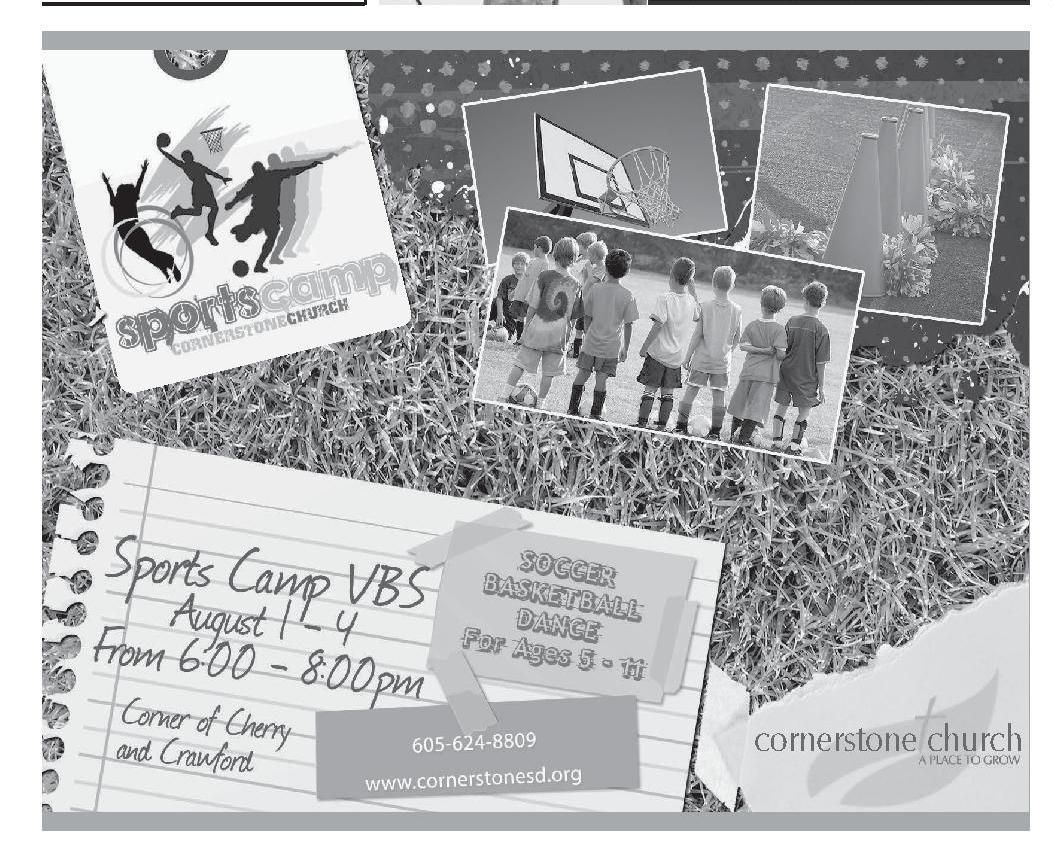
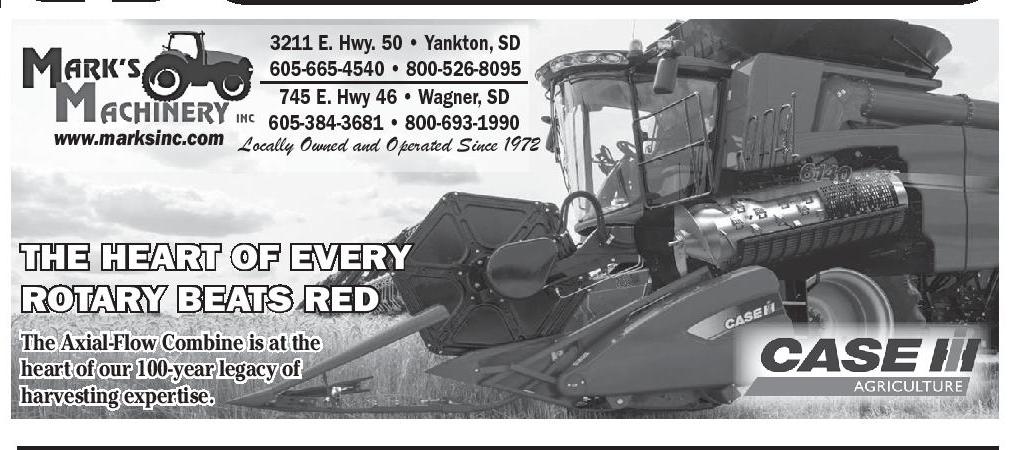






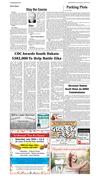
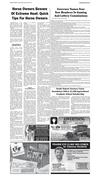

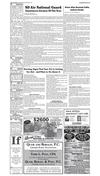

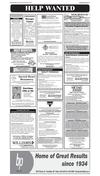
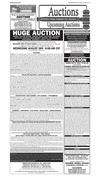


 Previous Page
Previous Page






